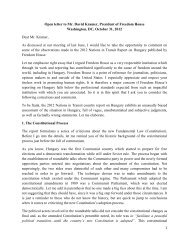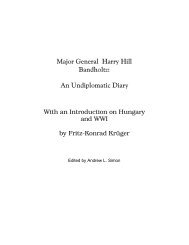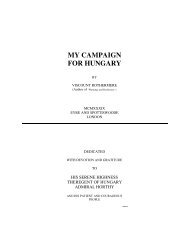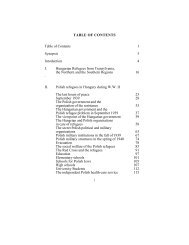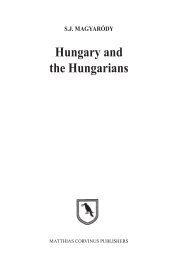The Fate of Western Hungary 1918-1921 - Corvinus Library ...
The Fate of Western Hungary 1918-1921 - Corvinus Library ...
The Fate of Western Hungary 1918-1921 - Corvinus Library ...
You also want an ePaper? Increase the reach of your titles
YUMPU automatically turns print PDFs into web optimized ePapers that Google loves.
and not to start to travel towards <strong>Western</strong> <strong>Hungary</strong>.<br />
<strong>The</strong> most crucial point in the disbanding <strong>of</strong> the volunteer force was number<br />
three, which stated: “<strong>The</strong> leaders and participants <strong>of</strong> the action receive complete<br />
assurance that they will not be held accountable for their actions, except for any<br />
crimes and <strong>of</strong>fences arising from greed.” István Friedrich and Nándor<br />
Urmánczy were asking for amnesty from the government. Finally, they stated<br />
that they would not take any responsibility 328 in the future, as they had not in<br />
the past, for the volunteer units <strong>of</strong> Iván Héjjas and György Hir. 329 (György Hir<br />
was, at this time, a National Assembly representative and, with Nándor<br />
Urmánczy, Viktor Maderspach and Dr. Dezső Wein, a reserve medical captain,<br />
were part <strong>of</strong> the inner staff <strong>of</strong> István Friedrich.)<br />
In the central portion <strong>of</strong> the Borderland, clashes continued between the<br />
volunteer rebel forces and the inward bound Austrian units. Beside the already<br />
mentioned clashes <strong>of</strong> Aug. 28-29 at Ágfalva, Pinkafő and Nagyszentmihály,<br />
there were also firefights at Felsőőr – where Árpád Taby and eight rebels, with<br />
only one machine gun and their rifles, put to flight 200 Austrians – Alhó,<br />
Fraknó, Borostyánkő and Németgyirót, resulting in the rebels successfully<br />
pushing the Austrian invaders across the border into Austria. 330 Columns 11 and<br />
12 <strong>of</strong> the Austrian gendarmes, advancing in the South, were attacked by the<br />
rebels on August 29. In the village <strong>of</strong> Nagyfalva near Szentgotthárd, a 35strong<br />
unit, led by György Endresz, 331 successfully dislodged the Austrians<br />
from the village. After getting a few reinforcements, he beat back the Austrian<br />
gendarmes, along with a Volkswehr company come to reinforce them, to the<br />
Austrian side <strong>of</strong> the border. 332 By August 31, not only the area around<br />
Gyanafalva and Rábakeresztúr but the entire zone East <strong>of</strong> the pre-Trianon<br />
border up to Pinkafő was under the control <strong>of</strong> the rebels. In the last days <strong>of</strong><br />
August and early September “our rebel units, marching day and night,<br />
appearing here and there, are being unbelievably overestimated, and over<br />
reported and these preposterous numbers are further swollen by the fantasies <strong>of</strong><br />
328 MOL. K 26. 1388. csomó 1922–„H” tétel, p. 321.<br />
329 György Hir (1888-1926), fought on the Eastern Front beginning in 1914.<br />
Transferred to the <strong>Western</strong> Front near Verdun in 1916 with the 69 th Infantry Regiment<br />
<strong>of</strong> Székesfehérvár. Making use <strong>of</strong> his combat experience, he helped set up the first close<br />
order combat units <strong>of</strong> the Austro-Hungarian Monarchy.<br />
330 Missuray-Krúg, 1935, op. cit., pp. 74–83; Ádám T., 1939, op. cit., pp. 29–30.<br />
331 György Endresz (1893-1932), served as pilot in WWI, then commander <strong>of</strong> a “Red”<br />
airforce company in Győr during the Hungarian Soviet Republic. In 1931, he set a<br />
world record <strong>of</strong> 26 hours and 20 minutes by flying across the Atlantic in his plane,<br />
Justice for <strong>Hungary</strong>, taking <strong>of</strong>f from Grace Harbour in Newfoundland, crossing the<br />
Atlantic and western Europe to land near Budapest. For their feat, he and his navigator<br />
received Lord Rothermere’s grand prize for cross-ocean flight. In 1927, Lord<br />
Rothermere had run an article in his paper, “<strong>Hungary</strong>’s Place in the Sun” (Daily Mail,<br />
June 21), in which he drew attention to the unjust borders dictated by the Trianon<br />
Treaty.<br />
332 A Rongyos Gárda…, op. cit., pp. 148–154.<br />
127




